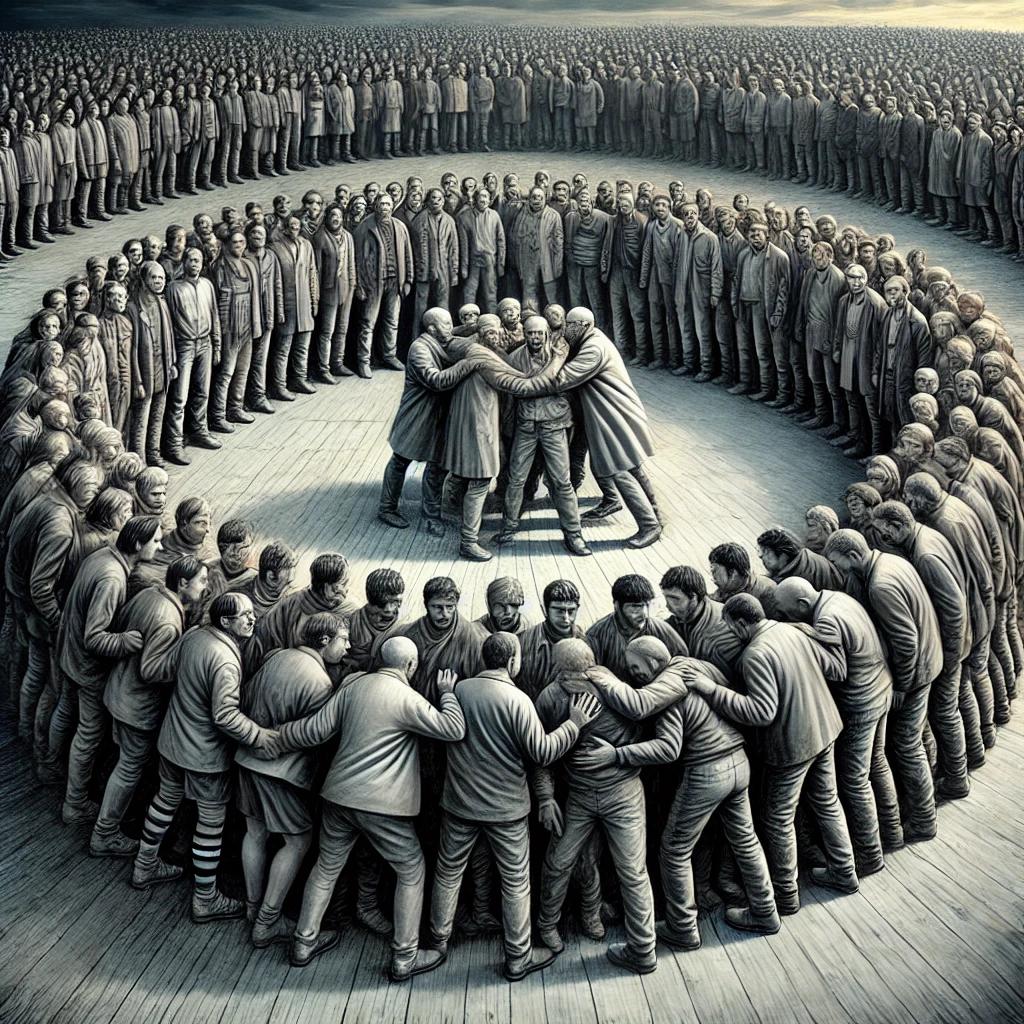Human behavior is deeply rooted in evolutionary psychology. Our instincts, shaped over millennia, were crucial for survival in prehistoric times. However, in today’s modern society, these same instincts can be exploited. The super-rich, with their vast resources and understanding of behavioral patterns, manipulate these instincts for their own gain. This extends to areas like xenophobia, nationalism, morality, religion, and ideology. Here is how they do it.
Exploiting xenophobia

Xenophobia – the fear or distrust of outsiders – was originally a survival mechanism. Early humans lived in small groups, and strangers often posed a threat. This instinct remains hardwired into our brains, even though the context has changed. Xenophobia also provided an advantage in competing for partners by reinforcing in-group cohesion and reducing competition from outsiders, including immigrants, making individuals more attractive as loyal and resource-sharing mates. The super-rich exploit this by funding media and political campaigns that amplify fears about immigration, foreign influence, or cultural changes.
By controlling narratives, they divert public attention from systemic issues like wealth inequality. Politicians backed by wealthy donors often exploit xenophobia and other forms of discrimination – targeting groups such as immigrants, racial minorities, LGBTQ+ individuals, or religious communities – to gain votes. This rhetoric fosters divisions, keeping the public distracted from underlying economic injustices. Meanwhile, the policies these politicians enact serve the interests of the wealthy elite, often harming the very people whose fears and biases they manipulated for political gain.
Amplifying nationalism – us/them
Nationalism is deeply rooted in our tribal past, evolving from an instinct to protect and remain loyal to one’s group for survival. In its modern form, this manifests as patriotism or nationalism, often amplified by cultural symbols and shared identities. The super-rich and powerful exploit this instinct, aligning their business interests with national pride to manipulate public sentiment. Corporations often present themselves as “local champions,” masking harmful practices like worker exploitation, environmental degradation, or tax avoidance, all while benefiting from the public’s loyalty to the nation.
They own and want to own whole economies
Military conquest and the pursuit of economic power are prime examples of this exploitation. Defense contractors, many of whom are tied to the wealthiest individuals and corporate entities, capitalize on nationalist fervor. By stoking fears of external threats and promoting the narrative that increased military spending is essential for national security, they secure massive government contracts. This diverts public funds from crucial social programs like education, healthcare, and housing into defense budgets, further deepening inequality.
The intersection of nationalism and economic interests extends beyond defense. Nationalistic rhetoric is often used to justify aggressive foreign policies or interventions. Under the guise of protecting national interests, these actions frequently aim to secure access to natural resources, open markets, or maintain geopolitical dominance. The wealthiest benefit from these ventures, as the profits from resource extraction, weapons manufacturing, and reconstruction flow to their businesses. In contrast, the burden falls on ordinary citizens, who face higher taxes, reduced public services, or even the loss of lives in conflicts.
Division
Nationalism is also weaponized to suppress dissent and unify the public against scapegoats. Marginalized groups, such as immigrants, minorities, or those with differing ideologies, are often framed as threats to national identity. This tactic shifts attention away from systemic problems like wealth inequality or political corruption, directing public frustration towards convenient targets. Meanwhile, policies and decisions that serve the wealthy elite continue unchecked, protected by the shield of national loyalty.
By framing their agendas within the narrative of national pride and security, the super-rich consolidate power and wealth. This exploitation of nationalism not only perpetuates inequality but also erodes social cohesion, turning a once-essential survival instinct into a tool for economic and political dominance.
Manipulating morality

Our sense of morality evolved as a mechanism to maintain social cohesion in small, tightly-knit communities. Punishing wrongdoers was a way to protect the group from harm and uphold fairness, ensuring survival and stability. This moral instinct remains deeply ingrained, making people naturally attuned to day-to-day morality, which focuses on visible, relatable issues like theft, violence, or betrayal. The super-rich, whose actions often operate on an abstract or systemic level, fall outside this scope of intuitive morality, allowing their misconduct to go unnoticed or unchallenged by most.
The most heinous crimes are heinous, the super-rich are as well heinous
The super-rich exploit this by funding media outlets that sensationalize crime and punishment, shaping public perception. Television shows, news reports, and online platforms often exaggerate the prevalence of violent crimes or deviant behavior, creating a distorted view of reality. This focus diverts attention from systemic issues – such as corporate exploitation or wealth inequality – and redirects moral outrage toward individual wrongdoers, typically from marginalized groups. The public’s demand for harsher laws and punishments grows, reinforcing a justice system that disproportionately targets the disadvantaged.
Historically, harsh punishment served an adaptive purpose, deterring harmful behavior and maintaining order in small communities. In modern societies with complex legal, social, and economic structures, this approach becomes less effective. Instead of resolving root causes like poverty or lack of education, it perpetuates cycles of marginalization and incarceration. Private prison systems, often owned or heavily invested in by the super-rich, profit from this demand for punitive justice, turning moral outrage into economic gain.
How the super-rich exploit our evolutionary behavior: Masked by philanthropy
Simultaneously, the super-rich carefully craft images of moral superiority through philanthropy and charitable initiatives. By funding high-profile causes or creating foundations in their names, they portray themselves as benevolent leaders working for the greater good. These curated narratives distract from exploitative practices, such as tax evasion, labor exploitation, or environmental destruction, shielding them from scrutiny. This moral posturing also reinforces their dominance, as it consolidates public trust while deflecting criticism.
This moral framework, however, is just one of countless possible systems. Alternatives like total utilitarianism – focused on maximizing overall happiness and well-being – offer intriguing solutions to societal problems. For instance, systemic reforms prioritizing education, healthcare, and social equality could create societies with vastly higher levels of happiness and reduced suffering. While such approaches may seem idealistic, they are not utopian. They represent practical shifts in focus from punitive justice and wealth hoarding to holistic well-being and equitable resource distribution.
By rethinking morality at a societal level, moving beyond reactive instincts toward broader ethical considerations, we could address issues of inequality and systemic exploitation more effectively. This would challenge the dominance of the super-rich and pave the way for a society that prioritizes collective happiness over concentrated power.
Manipulating religious instincts

Religion has long been a cornerstone of human societies, offering moral guidance, fostering community cohesion, and addressing existential questions. These functions, while beneficial, also make religion a potent tool for those seeking to consolidate power. The super-rich often exploit religious institutions and narratives to align with their interests, diverting attention away from systemic issues like wealth inequality, environmental degradation, and labor exploitation.
Read the Bible, forget the super-rich
By funding religious organizations or movements, the ultra-wealthy can promote doctrines that serve their agenda. For instance, prosperity theology – a belief that wealth and success are divine blessings – glorifies material accumulation and discourages criticism of economic inequality. This teaching suggests that poverty is a moral failing rather than a consequence of systemic exploitation, shifting blame onto individuals rather than addressing structural injustices. Similarly, religious teachings that emphasize obedience, submission to authority, or the sanctity of hierarchy discourage dissent and normalize social stratification, effectively legitimizing the power of the wealthy.
Historically, the integration of religion into political agendas has further amplified its utility as a distraction. In the United States, the Republican Party strategically co-opted conservative Christian values during the late 20th century. Recognizing the mobilizing potential of religious rhetoric, leaders like Ronald Reagan championed issues such as abortion, school prayer, and “traditional family values.” This alliance framed their policies as moral imperatives, creating a narrative where opposition to the Republican agenda was equated with opposing morality itself. This fusion of religion and politics not only galvanized a loyal voting base but also diverted attention from economic policies that disproportionately benefited the wealthy elite.
Religous institutions
Religious institutions often serve as vehicles for financial manipulation by the super-rich. Charities and churches provide tax shelters, allowing wealthy individuals to move significant assets under the guise of philanthropy while maintaining public admiration. This financial maneuvering not only preserves their wealth but also reinforces their image as moral and charitable figures, shielding them from criticism.
Moreover, religion’s focus on existential questions – such as salvation, the afterlife, or divine purpose – can distract adherents from immediate, worldly issues. Instead of addressing systemic problems like poverty, climate change, or corporate exploitation, religious narratives often frame suffering as part of a divine plan or as a test of faith. This shifts attention away from structural causes and discourages collective action, leaving the root problems unchallenged.
By controlling religious narratives, the super-rich ensure that their actions are perceived as aligned with moral values. For example, funding faith-based initiatives or aligning with religious causes allows them to present themselves as defenders of cultural or spiritual heritage. This creates a facade of moral legitimacy that obscures exploitative practices, consolidating their power while further entrenching systemic inequalities.
How the super-rich exploit our evolutionary behavior: Controlling ideologies – no left or right
Ideologies provide frameworks for understanding the world. Whether religious, political, or economic, they influence how people think and act. The super-rich fund think tanks, universities, and media outlets to shape these ideologies in ways that benefit them.
All of these are just evolutionary adaptations: liberalism, conservatism, socialism, communism, anarchism, fascism, capitalism, environmentalism, feminism, nationalism, libertarianism, totalitarianism, monarchism, transhumanism, globalism, isolationism, progressivism, traditionalism, pacifism, nihilism, existentialism,, objectivism, syndicalism, technocracy, populism, secularism, theocracy, postmodernism, constructivism, marxism, leninism, maoism, trotskyism, stalinism, neoliberalism, neoconservatism, social democracy, christian democracy, islamism, zionism, pan-africanism, pan-arabism, mutualism, structuralism, nationalism, antinatalism, feminism, humanism, pragmatism, individualism, collectivism, egoism, communitarianism, federalism, imperialism, colonialism, existentialism.
For example, neoliberalism – the belief in free markets and minimal government intervention – was popularized through heavily funded academic and policy initiatives. This ideology justifies tax cuts for the wealthy, deregulation, and privatization, all of which concentrate power and wealth in fewer hands.
Billions of the unborn are just shadows, doctor-killers get away

However, ideological frameworks are not limited to left versus right. There are other spectrums: science-based economy, stopping doctors from killing 200,000 Americans per year, natality policies (when someone is killed (and I despise this), it is a huge problem – not having been born is nothing in the society), global government, help to other countries and so well and many more (see below).
That more accurately reflects the complexities of modern society. By reducing political and social conflicts to simplistic binary oppositions, the super-rich ensures public focus remains narrow and polarized. Nuanced issues like wealth concentration, ecological collapse, and systemic inequalities are buried under tribal-like ideological battles, distracting society from addressing deeper problems.
The super-rich: We feed you the only possible two-dimensional spectrum

By aligning themselves with specific ideologies, the super-rich create an environment where their accumulation of wealth is seen not only as acceptable but desirable. Religious ideologies, political doctrines, and economic theories are manipulated to validate their dominance, ensuring continued public support or indifference.
Here is my propsed spectrum (and it is multidimensional):
More redistribution/Less redistribution
Liberal/Conservative
Anti-consumerism/Consumerism
Tens of percent of GDP investing in science/Little investment in science
Trillions of dollars for building whole countries/Little aid
Complex grasp of what surplus value is and how to change the constellation of the whole system/Unregulated savage capitalism
Pro-eugenics/Ill society
Clientelism-free politics/Patron-client political style
Massive support of natality/Few people being born
Animal-like stories news/Statistical-mathematical educational news
Lifetime education on how to change politics/Obscurantism
Anti-corruption fight/Corrupt politics
State atheism/Believing in superstitions
Forced collaboration of all political parties on common issues/Partisan politics
Cultural changes of ordinary people for better/Conservative cultures
Vegan, vegetarian society/Mass torture-prone concentration camps
Anti global warming/Denial
Paying the smartest people to be politicians/Feeble-minded prone to manipulation politicians
Eugenically healthy people – less money for a cure, more money for medical research/Ill society with trillions paid for a cure
Eugenically healthy people – less criminals, less prisons/Society full of crime
AI-friendly society/Anti AI
Global government/Eternal nationalistic wars
Global redistribution of wealth/National redistribution
Speaking one language/Babylon
Global educational system/Poor educational system around the world
People having access to a political background/Shallow hidden politics
Right to work, right to have decent housing, right to have adequate money/Savage capitalism
Morality improvement/Nihilistic-like morality
Legalizing drugs/War on Drugs
Education system renaissance/Rigid education system
Placing the brightest minds where they belong/Commercial misuse of the smartest
Banning lobbyists (governments would find out what is really needed to do)/Corrupt politics
Medical supervision/Estimated 200,000 people die from medical malpractice annually in the US
People not functioning in capitalism socially secured/The homeless army
Exploiting fear of scarcity
The fear of scarcity is a deeply ingrained survival instinct. In prehistoric times, resources were often limited, and those who hoarded food, tools, or shelter were more likely to survive during times of crisis. Today, the super-rich exploit this fear by creating artificial scarcity in critical markets.
For example, housing shortages are exacerbated by land monopolies and speculative real estate investments, driving up prices and increasing inequality. Similarly, corporations artificially limit the supply of goods, like luxury items or essential resources, to drive demand and inflate prices. These manipulations capitalize on our instinct to secure resources when they appear scarce, forcing people to compete and spend more.
The fear of scarcity is also weaponized in the labor market. By creating perceptions of job shortages or economic instability, the super-rich can justify lower wages. They can also exploit workers, and dismantle labor protections. This manipulation reinforces their dominance while keeping the majority in a constant state of insecurity.
First get rid of clientelism, then establish total utilitarianism

Understanding how the super-rich exploit our evolutionary behavior is crucial for resistance. Recognizing these manipulations can help us focus on systemic issues rather than manufactured divisions. We must critically evaluate the narratives we consume, question the motivations behind policies, and seek unity in addressing inequality.
The instincts that once ensured our survival now risk being weaponized against us. By becoming aware of these tactics, we can reclaim control over our behaviors and work towards a fairer, more equitable society.
A world without clientelism or a party getting rid of clientelism could turn things upside-down.
Not only would there be no super-rich in a system like total utilitarianism, but it would also lead to the creation of infinite consciousnesses with the happiest experiences.

Leave a Reply